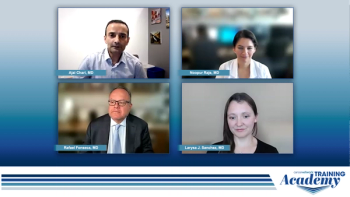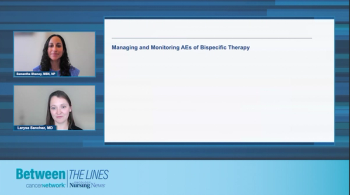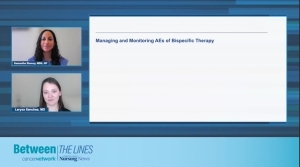
Noopur Raje, MD, discusses the role of T-cell affinity in bispecific therapy for patients with relapsed/refractory multiple myeloma and how it impacts treatment practices.

Your AI-Trained Oncology Knowledge Connection!


Noopur Raje, MD, discusses the role of T-cell affinity in bispecific therapy for patients with relapsed/refractory multiple myeloma and how it impacts treatment practices.

The panel discusses the benefits of having multiple BCMA-targeting bispecifics available for patients with relapsed/refractory multiple myeloma.

Rafael Fonseca, MD, discusses the role of bispecifics in relapsed/refractory multiple myeloma and the implications of incorporating them into combination regimens.

Noopur Raje, MD, reviews clinical research on elranatamab combination therapy in patients with relapsed/refractory multiple myeloma.

Experts provide advice for patients and caregivers with relapsed/refractory multiple myeloma considering talquetamab or another bispecific, while all faculty will discuss unmet needs and future perspectives in the treatment of relapsed/refractory multiple myeloma.

Experts discuss prophylactic measures for managing potential adverse events associated with talquetamab and other bispecifics, while all faculty will offer advice for health care providers involved in the care of patients receiving talquetamab.

Focusing on clinical trials evaluating combination strategies with bispecifics, Larysa J. Sanchez, MD, discusses the TRIMM-2, TRIMM-3, and MajesTEC-3 studies.

Rafael Fonseca, MD, discusses the MonumenTAL-2 and MonumenTAL-3 clinical trials investigating talquetamab combination strategies in relapsed/refractory multiple myeloma.

Experts provide advice to patients and caregivers on managing oral and skin toxicities.

Experts discuss the adverse events observed with talquetamab, including oral toxicities and skin and nail issues, and how these are managed.

Hematologist-oncologists discuss GPRC5D-targeting treatments that are currently in development for patients with relapsed/refractory multiple myeloma.

Noopur Raje, MD, shares clinical perspectives on her experience treating patients with prior BCMA bispecific exposure and provides insights on adverse event management practices in patients receiving talquetamab.

Experts explore additional toxicities observed with B-cell maturation antigen–targeting bispecifics, such as infections, neurotoxicity, and hematological issues, and discuss how these are managed in practice.

Experts explain the administration of step-up and treatment doses for GPRC5D at your institution, including whether they are given in clinic or in the community, and will discuss how patients are monitored for cytokine release syndrome and immune effector cell–associated neurotoxicity syndrome during the step-up phase.

Larysa J. Sanchez, MD, discusses recent efficacy data presented at EHA 2024 from the long-term follow-up results of the phase 1/2 MonumenTAL-1 study investigating talquetamab in relapsed/refractory multiple myeloma.

A panel of experts on multiple myeloma discuss the importance of GPRC5D as a target of interest in relapsed/refractory disease and discuss their experiences with talquetamab in clinical practice.

Experts address the unique challenges in managing adverse events associated with GPRC5D therapies compared to other cancer treatments, while Samantha will discuss strategies for preparing and educating patients undergoing GPRC5D therapy.

Experts give an overview of safety data from the MonumenTAL-1 study.

Experts give an overview of long-term follow-up efficacy data from the MonumenTAL-1 study.

Medical experts give an overview of relapsed/refractory multiple myeloma, focusing on diagnosis and current management strategies

Published: August 27th 2024 | Updated: